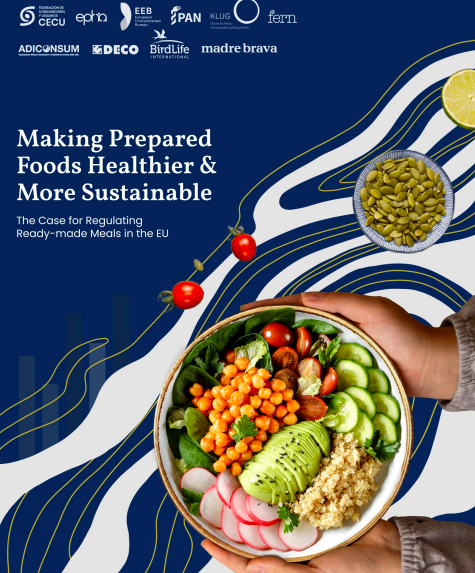EU could slash 48 million tonnes of emissions and save €2.8 billion annually with healthier ready meals. The study unveils a path toward reducing diet-related diseases such as cancer, cardiovascular disease, liver disease, and diabetes by aligning ready-made meals with health & sustainability guidelines.
Requiring large ready-made meal distributors in the EU to comply with health & sustainability standards would reduce the main diet-linked diseases, the cost of ingredients & the EU’s greenhouse gas emissions by 1-2%!
The Reports Key findings:
Making ready meals cheaper: Contrary to common belief, healthier and sustainable options don’t have to break the bank. The study reveals that these improved meals could save EU consumers €2.8 billion annually, making nutritious choices cheaper and more accessible. This is key, as low-income consumers are the main customer base for this food category.
Climate win: By making ready meals more sustainable, the EU could reduce greenhouse gas emissions by a staggering 48 million tonnes annually. This is equivalent to removing up to 38 million new cars from the road every year. This is nearly as many cars as there are in the whole of France (39 million).
Healthier meals, healthier people: The study unveils a path toward reducing diet-related diseases such as cancer, cardiovascular disease, liver disease, and diabetes. Aligning ready-made meals with established health guidelines would lessen the significant burden these diseases place on European public healthcare systems. Currently, about one million deaths every year in the EU are attributable to unhealthy diets.
Corporate responsibility: Large supermarkets, catering companies, and restaurant chains are urged to adopt these standards, as they play a pivotal role in the distribution of ready-made meals. Big corporations control the distribution of ready-made meals, accounting for 78% of sales in the retail sector and 48% in the food service/catering sector, so changes can be mandated without harming small and medium-sized enterprises.This shift would not only benefit consumers but also showcase corporate commitment to public health and sustainability.
Urgency for action: Ready-made meals constitute one-sixth (17%) of the EU’s total calorie intake. This is also part of an upward trend; over the past 15 years, people in Italy, Germany and Spain have been eating between 40% and 60% more ready meals, underscoring the urgent need for regulatory action to avert impending health crises.
On average EU citizens over consume salt, sugar, fat, animal proteins (beef, pork, eggs, dairy, and poultry in particular) and calories; and under-consume vegetables, fruits, whole grains and legumes. Therefore, regulating pre-prepared foods is a win-win-win for people’s health, pockets and the planet!
The study was conducted by the system change company, Systemiq, for a coalition of 10 health, consumer, and environmental organisations:
- Adiconsum Nazionale
- BirdLife Europe and Central Asia
- Deutsche Allianz Klimawandel und Gesundheit (KLUG)
- European Environmental Bureau (EEB)
- European Public Health Alliance (EPHA)
- Federación de Consumidores y Usuarios (CECU)
- Fern NGO
- Madre Brava
- Physicians Association for Nutrition International (PAN)
- Portuguese Association for Consumer Protection (DECO)

